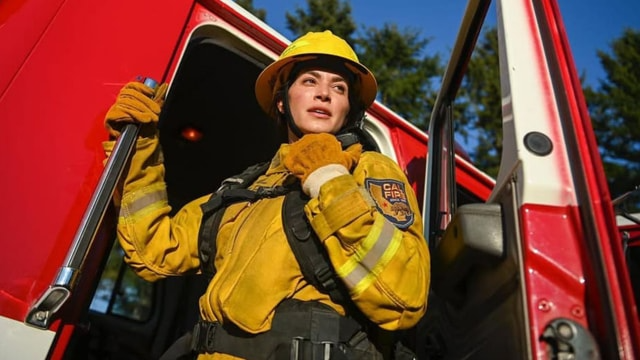
The One Who Left—But Didn’t Forget
When Gabriela Perez (Stephanie Arcila) left Edgewater, it was framed as a step forward—a chance to escape the tangled mess of lost love, family conflict, and identity confusion. But as Season 4 unfolds, rumors of her return hint at a much more complicated narrative: not a triumphant comeback, but a reckoning with the ghosts she tried to leave behind.
Gabriela’s re-entry into the world of Fire Country offers the show a profound opportunity: to explore what it means to leave, to heal, and to confront the wounds that time alone cannot close.
Why She Left—and Why It Still Hurts
Gabriela didn’t just leave Bode. She left her job, her father Manny, and the only community that ever truly knew her. Her departure stemmed from accumulated trauma: the pressure of being perfect, the fear of failing those she loved, and the devastation of seeing Bode relapse.
In her absence, she’s tried to rebuild—taking a position with an urban EMS unit, engaging in therapy, and focusing on her physical health. But emotional pain doesn’t stay buried. It surfaces in moments of quiet, in smells, in dreams. And now, Edgewater is calling her back—whether she’s ready or not.
Returning to a Changed Landscape

When Gabriela arrives, nothing is the same. Vince is gone. Station 42 is fractured. Bode is hardened. Manny, older and more subdued, barely recognizes the daughter who once mirrored his pride.
Her reappearance is not met with cheers. There is resentment, especially from those who stayed and bore the brunt of the town’s grief. Some accuse her of abandoning her post. Others quietly wonder if she’s back for redemption—or just out of guilt.
Bode and Gabriela: A Love Story That Refuses to Die
The dynamic between Bode and Gabriela remains central, but no longer romantic in a traditional sense. They don’t rush into each other’s arms. Instead, they circle one another warily, both carrying new scars.
They begin by arguing. By blaming. By revisiting the night they fell apart.
But something else begins to surface: understanding. Not of who they were, but of who they became apart. For the first time, they stop trying to save each other—and start simply listening.
Mental Health and Female Strength in Crisis
Gabriela’s character becomes a vital vessel for exploring post-traumatic growth. The show allows her to speak openly about anxiety, burnout, and panic attacks—subjects rarely shown with sincerity in network dramas.
In one standout episode, she responds to a wildfire call and freezes mid-rescue—memories from a previous near-death event paralyzing her judgment. But instead of brushing it off, she owns her moment of fear, seeking support from Eve and eventually opening up in a rare one-on-one conversation with Sharon.
Her vulnerability isn’t weakness—it’s courage, and the series treats it as such.
A Legacy of Forgiveness
As Gabriela begins to rebuild relationships—with her father, with Bode, with herself—her arc mirrors the larger theme of Fire Country: redemption doesn’t mean pretending the past didn’t happen. It means facing it and choosing to grow.
By season’s end, Gabriela is no longer just “the girl Bode loved.” She’s a fully realized woman, a skilled EMT, a flawed daughter, and a survivor.
Her final decision—whether to stay in Edgewater or leave again—will carry not just narrative weight, but emotional finality. And perhaps, through her eyes, viewers will come to understand that healing isn’t linear—but it is possible.
